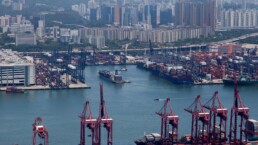Image: Concise News
Lagos is undoubtedly the fastest city in Nigeria. Contrary to popular belief, this fast-pace is not born out of the imbibed hustle spirit of Lagosians. It is rather as a result of the necessity of it – a simple act of survival. There is an image of the typical pedestrian in Lagos, Jamiu. Jamiu lives in Egbeda and works in Victoria Island which is a distance of about 36.2kms. Due to the overcrowded nature of the state, to make it in time to work which typically starts at 8:00am, he has to wake up as early as 4:00am to beat traffic. If he is late, he will be served a query; multiple of which means he could lose his job in an economy where jobs are already very limited. He leaves his house by 4:30am and because he is not the only person who sets off early in an attempt to beat the traffic, he escapes it for only about the first 30 minutes of his journey and spends the rest of the time stuck in a filthy bus which never gets washed, deal with multiple stops, listen to preachers preach and watch peddlers moving between cars in the traffic as they sell their wares.
After spending a minimum of 2 hours on the road, he makes it to work just in time and resumes his day already feeling sleepy. The time for the official close of business comes, but Jamiu opts to stay stay a little longer, because nobody actually leaves at 5:00pm. He has to wait till 7:00pm before commencing his journey home. Alas, after a long day at a job that barely covers his transportation and feeding costs, he must stand at the bus stop waiting for a bus he can get onto, one he must jostle several others whose day was typically like his to make his way into. If he is lucky, a kind car owner going in his direction will offer him a lift in exchange for a fair sum of money. After an average of 45 minutes to an hour of waiting at the bus stop, he finally succeeds in elbowing his way into a bus to his first stop. After three different buses and a motorcycle, he finally gets home by 11:20 pm only for the same cycle to begin again at 4:00am the next day. Even though some days are slightly better than others, this typically is the nature of his day at least five days a week, for several years of his life.
If you live in Lagos, this story would not be uncommon to you. Not only would you know people who live like this, you would have lived like this at some point, or this would probably be life as you know it. And to make matters worse, you would believe it is perfectly normal. An interesting way most workers who live like this justify their “hustle” is that they are ‘paying their dues’. However, the very fact that a system this rough has become normal is a testament of the terrible standard of living of the masses in Lagos. In the state, there are three main transport vehicles: private cars, public buses, and motorcycles/tricycles. There is no working train system, and the water transport system is fueled by “prayers”. Worse, the main commercial district of the entire state is on Lagos Island, an area with only two main routes. So the consequence is that majority of the population uses the same limited and pothole ridden routes all the time to reach their destinations. The ripple effect of this is the unpredictability of movements. Beyond the regular daily traffic, events like rain or minor breakdowns are enough to extend commuting time by hours, not to mention when extraneous factors like floods and fuel scarcity come up.
While statistical research for the direct correlation between time spent in traffic and economic productivity is not readily available, it is clear to see the toll it is taking on the people. Out of 231 cities surveyed by Mercer Global Quality Of Living Index For Cities in 2018, Lagos is ranked 212th. Mercer’s evaluation is formed on the basis of 10 broad categories. These categories are: political and social environment; economic environment; socio-cultural environment; medical and health considerations; schools and education; public services and transportation; recreation; consumer goods; housing; and natural environment. Traffic in Lagos has increased over the years, and with its teeming and surging population, things are expected to get worse if no alternate mode of transportation is developed. Projects to establish a workable train system in the state have remained uncompleted for decades. Greatly affected by the strain of the poor transport system, individuals and businesses have tried to help in whatever way possible. For one, Traffic radio and google maps are life savers but things will indeed continue to regress lest a permanent solution is put forward. People will continue to suffer in the name of paying their dues or hustling, and Nigeria will end up having a tired disillusioned people who will know nothing of what it means to live a life of tranquility even at the most basic level.
The solution to this problem is not far from the solutions that are already being proffered. First, there needs to be a diversification of modes of transportation and the best bet is the railway system. The Red Line Rail project is an ongoing Lagos State project. More effort needs to be deployed to speedily launch it, lest we spend another decade carrying out developmental studies. Another mode is water. However, the unavailability of adequate infrastructure has made it somewhat of a risky affair. Efforts should be put in place to make it a viable option for masses that may prefer that as a more viable transport option. Finally, there is the need to spread Nigeria’s economic hub from Lagos to other less constrained states. Only then can people have the freedom to enjoy life even as they strive for growth and contribute towards economic development.
The views expressed in this article are those of the author alone and not the Future Africa Forum.
The views expressed in this article are those of the author and do not necessarily reflect the views of Future Africa Forum. Future Africa Forum is a pan-African policy think-tank and policy advisory consultancy headquartered in Nairobi, Kenya.



